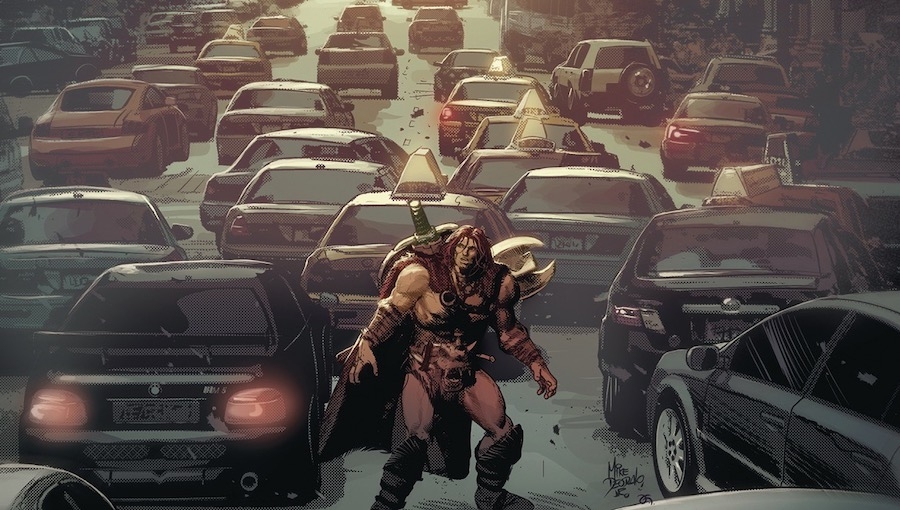Worlds collide when a barbarian warrior is ripped from his fantasy realm and dropped into a modern-day metropolis. Writer Jeff Lemire and artist Mike Deodato Jr’s newly collected Berserker Unbound begins with standard sword-and-sorcery fair, but ultimately reveals itself as an affecting examination on grief and recovery.
The Mongrel King returns from battle to find his family slaughtered by the savage horde of an evil sorcerer. Wounded and distressed, the warrior wanders into a cave, where mystic runes entangle him in a wormhole and transport him to an unfamiliar modern city. A sympathetic homeless man named Joe Cobb finds and rescues the stranded warrior, and even though they cannot communicate, the two find common ground when faced with the dangers and despairs of urban life. As he struggles to return to his world, the warrior must protect himself and the homeless man from the old nemeses that threaten the new world.
If you’re expecting this book to be a frivolous romp through mismatched genres, similar to the 1970 Arnold Schwarzenegger camp classic, Hercules in New York, then let me put your fears to rest. Berserker Unbound embraces some of the tropes inherent to fish-out-of-water stories, like when the Mongrel King uses a gold coin to pay for wine at a liquor store, but avoids its major pitfalls. At the same time, it exploits a few of the savage fantasy genre mainstays, like his bulging muscles and costume design, but never in a way that feels gratuitous.
Although Berserker Unbound doesn’t have the sprawling scope of Descender or Black Hammer, it still bears familiar hallmarks of a great Lemire story. It has deftly subtle dialogue that’s more about what’s not said than what’s said. And it has two main characters that are relatable and well rounded. At first, Berserker Unbound leads you to believe that it’s all about revenge. The warrior says he wants to return home, avenge his family, and join them in death, but then he meets his companion in the city who has also experienced a tragic loss and is similarly displaced. Tthe narrative that began epic in issue one becomes intimate in issue four, as two characters that have nothing left to fight for end up fighting for each other.
The book’s strengths are its heroes, but the villain was unfortunately one dimensional. The sorcerer’s motivations were unclear; he seemed merely evil for evil’s sake, and he lacked a personal connection to the warrior that would have tethered him tighter to the story.
Lemire and Deodato worked together previously on Marvel’s Thanos, and the art in Berserker Unbound demonstrates the strength of their collaboration. Deodato clearly enjoyed himself illustrating the barbarian violence. The book begins and ends with gleefully rendered splash pages depicting over-the-top frenzies of bodies, blades, and blood. But Deodato also imbues the characters with a great deal of heart and employs an impressive variety of layouts to control the pace of the story and heighten the emotional impact. Some wide shots are divided by white gridlines, separating a character from their surroundings and making them feel more isolated. Likewise, characters are placed close together in a small panels, highlighting the importance of their relationship. I also loved how the cross hatching and halftone dots added a thematically appropriate roughness to all of the characters and their surroundings.
Berserker Unbound: Volume 1 has an ending that I found both satisfying and definitive. But in a recent interview with Comiccon.com, Lemire and Deodato admitted to having plans for a Berserker Unbound trilogy. I’d be excited to see that happen.
Creative Team: Jeff Lemire (writer), Mike Deodato Jr. (artist), Frank Martin (colors)
Publisher: Dark Horse Comics
Click here to purchase.

